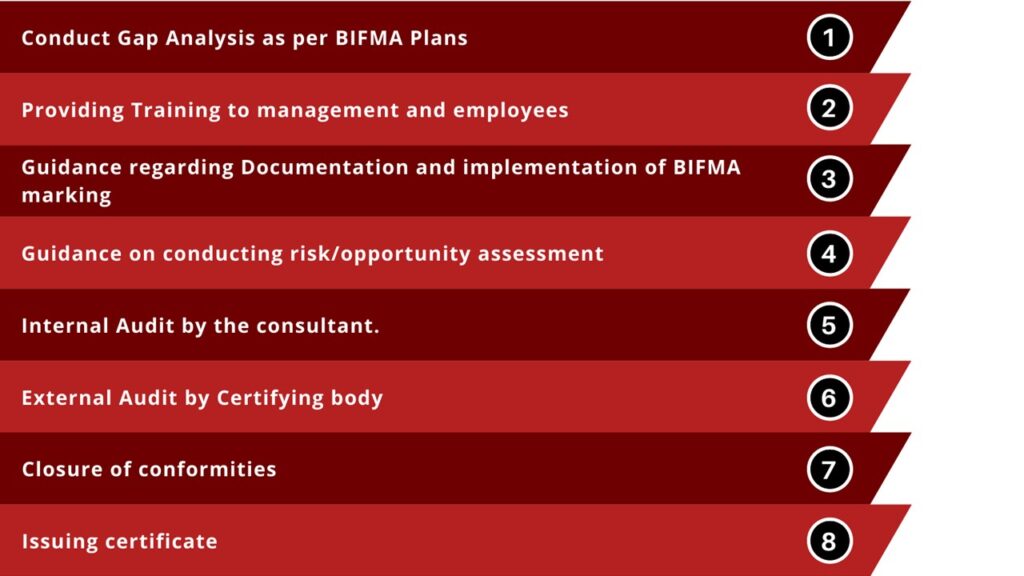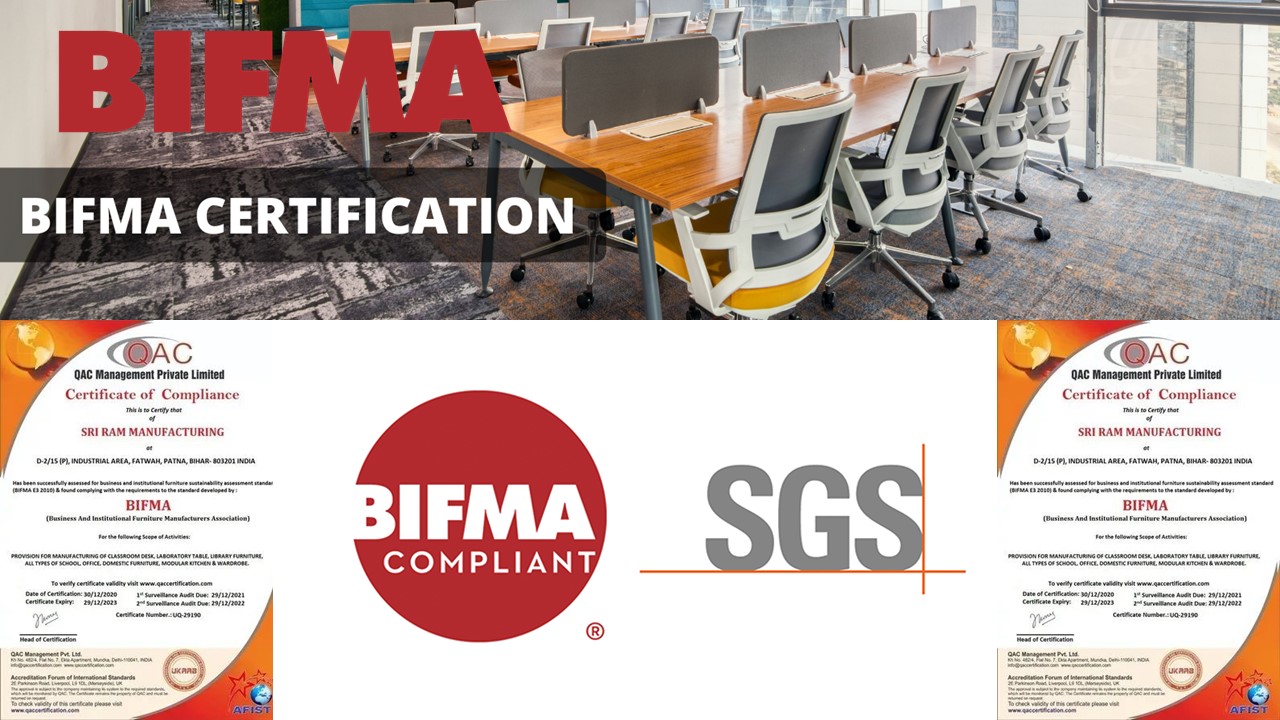Discover the importance, benefits, and process of BIFMA Certification for business and institutional furniture. Learn why it’s the mark of quality and sustainability in the furniture industry.
Introduction to BIFMA Certification
BIFMA (Business and Institutional Furniture Manufacturers Association) provides standards for commercial-grade furniture. When you’re seeking BIFMA testing and certification for an ergonomic chair, it’s important to understand that specific requirements and costs can vary based on the testing lab you select, the specific product being tested, and other variables.
BIFMA Certification History: A Benchmark for Furniture Quality and Safety
Established in 1973, the Business and Institutional Furniture Manufacturers Association (BIFMA) is a non-profit trade association founded through a collaborative effort, following the guidelines set by the American National Standard Institute (ANSI).
BIFMA’s primary objective is to set voluntary standards for business and institutional furniture manufacturers, ensuring they uphold the best practices for the furniture industry. This association plays a pivotal role in guiding, designing, advocating, advising, and establishing benchmarks for the office and institutional furniture sectors.
The foundation of every office is its furniture. To keep these environments functioning seamlessly, the reliability and longevity of the furniture are paramount. BIFMA Certification, therefore, encompasses various aspects such as:
- Safety and social responsibility
- Sustainability and environmental design
- Durability, strength, and overall quality
- Considerations of recyclability and recycled content
- Monitoring chemical content and emissions
- Ensuring reliability of electrical components
- Setting standards for flammability
- Focusing on material and energy efficiency
- Prioritizing waste and water management
In today’s era, BIFMA certification is widely recognized and valued as an indicator of furniture quality and safety. It provides a meaningful platform for manufacturers to showcase and achieve enhanced sustainability features. Those who earn the BIFMA certification seal affirm their commitment to the association’s guidelines and demonstrate the application of these standards in their products.
A distinctive feature of BIFMA is the flexibility it offers organizations in choosing their conformance level. This means that based on consistent product enhancements, an organization can elevate its products to a higher standard within the BIFMA framework.
The association evaluates furniture based on specific criteria, including:
- Materials used
- Energy and atmospheric considerations
- Impact on human and ecosystem health
- Emphasis on social responsibility
In essence, BIFMA’s certification is more than just a seal; it’s a testament to a manufacturer’s dedication to quality, sustainability, and societal responsibility.
Levels of BIFMA Certification
The BIFMA Certification provides a clear structure to gauge the commitment and adherence of furniture products to set standards of sustainability and quality. These standards are denoted through a point-based system, divided into three distinct levels. Let’s delve into the specifics of each level:
1. Level 1 Certification:
- Point Range: 32-44 points
- Description: This is the initial level of certification, indicating a basic adherence to BIFMA’s guidelines. Products falling into this range have met the essential criteria but have room for further improvement and alignment with higher standards.
2. Level 2 Certification:
- Point Range: 44-62 points
- Description: Achieving Level 2 Certification signifies a moderate to high commitment to the BIFMA standards. Products in this bracket not only meet the basic criteria but also incorporate additional sustainable and quality-driven practices.
3. Level 3 Certification:
- Point Range: 63-100 points
- Description: This is the pinnacle of BIFMA Certification. Products achieving Level 3 Certification showcase an exemplary commitment to sustainability, safety, and quality. Falling in this range indicates that the product has met and often exceeded the highest benchmarks set by BIFMA.
In summary, the levels of BIFMA Certification offer a tiered approach to categorize products based on their dedication to quality and sustainability, providing a clear benchmark for manufacturers and consumers alike.
BIFMA Certification Requirements
To achieve BIFMA Certification, industrial furniture must meet specific criteria that ensure both quality and sustainability. Below, we’ve outlined the primary requirements and the rationale behind them:
Adherence to Minimum Standards: To guarantee that all furniture aligns with the fundamental BIFMA benchmarks.
Conformance with the BIFMA Standard: The primary purpose of evaluating products against the BIFMA standard is to confirm their successful alignment with these rigorous guidelines.
Rigorous Product Testing: Conducting tests on the products ensures they meet or exceed the set benchmarks for durability, safety, and quality.
Efficient Material Utilization: This ensures that the manufacturing process uses materials optimally, reducing waste and promoting sustainability.
Energy and Environmental Considerations: BIFMA places a strong emphasis on eco-friendly manufacturing, focusing on both energy consumption and its broader environmental implications.
Use of Approved Chemical Constituents: Ensuring that the chemicals used in furniture production are safe for both users and the environment.
Maintenance of Production Facilities: This ensures that the facilities used for manufacturing are operated and maintained at the highest standard, promoting both worker safety and product quality.
Product Conformance Documentation: It’s crucial to maintain proper documentation that verifies a product’s conformance to the BIFMA standard.
Regular Internal Audits: Conducting internal audits confirms that the manufacturing process and end products consistently align with the BIFMA standards.
In essence, BIFMA Certification is not merely about producing quality furniture; it’s about doing so in a manner that prioritizes safety, sustainability, and responsibility.
Importance of BIFMA Certification
The world of office furniture is vast and diverse. To stand out in such a crowded market, having a mark of quality can make all the difference. BIFMA certification is that mark.
A Signal of Quality
When a product boasts a BIFMA certification, it signifies its adherence to the highest standards of safety, sustainability, and durability. For businesses, this means peace of mind knowing they’re investing in products that won’t let them down.
Sustainability Matters
BIFMA’s standards also emphasize sustainability. Given today’s environmentally-conscious market, aligning with such values can significantly boost a brand’s image. For more insights into leveraging this for your brand, check out this Upwork profile.
BIFMA Certification Process
Venturing into the BIFMA certification process requires commitment. But the rewards, as noted earlier, are worth the effort.

- Application: Begin by applying to BIFMA with details about your product.
- Testing: The product undergoes rigorous testing to evaluate its performance, safety, and sustainability.
- Evaluation: BIFMA assesses the results and determines if the product meets its stringent standards.
- Certification: Successful products are then awarded the BIFMA certification.
Benefits of BIFMA Certification
Enhanced Brand Reputation
With BIFMA certification, brands can position themselves as leaders in quality and sustainability.
Increased Market Access
Many institutional buyers and big businesses prefer or even mandate BIFMA-certified products. This opens up larger markets for certified brands.
Higher Customer Trust
A certification is an assurance to your customers about your product’s safety, durability, and eco-friendliness.
FAQs
Q: How long is the BIFMA certification valid?
A: Typically, the certification is valid for a few years. However, periodic checks are conducted to ensure the product still adheres to the standards.
Q: Can all furniture products obtain this certification?
A: BIFMA primarily focuses on business and institutional furniture. For specifics on which products can be certified, it’s best to consult with an expert. Here’s an expert you can consider.
Q: Is BIFMA certification recognized globally?
A: Yes, it is a globally recognized certification that is highly esteemed in the furniture industry.
Q: How many samples need to be taken for the tests?
Typically, multiple samples of the product are required, especially if there’s any form of destructive testing involved. The exact number varies based on the product and the tests being conducted. It’s always best to consult with the specific testing lab for precise requirements.
Q: How much cost per sample test?
The cost can vary widely depending on the specific testing lab, the country or region where the lab is located, the complexity of the product, and the range of tests required. It’s recommended to reach out directly to accredited testing labs for detailed quotes.
Q: How much cost for the BIFMA certification of this Ergonomic Chair?
Again, the cost can vary based on the lab and the product. There will likely be costs associated with the actual testing of the product samples, and then separate costs for the certification itself. Some labs might offer package deals, which include both testing and certification.
Q: Will we need to attend/face yearly Audit for this certification?
Some certifications, including certain BIFMA certifications, might require periodic audits to ensure ongoing compliance, especially if there are changes in the manufacturing process or components. Whether this is a yearly requirement often depends on the specifics of the certification and the product.
Q: How much we may have to pay for the Audits?
Audit costs can differ based on the scope of the audit, the auditor’s location, and potential travel costs, among other factors. In general, audit costs could be in the range of the initial certification costs or slightly less. However, it’s essential to get a detailed breakdown from the certification body or the testing lab.
Conclusion
BIFMA Certification is more than just a seal on your product. It’s a testament to a brand’s dedication to quality, safety, and sustainability. In today’s competitive market, having such a certification can be the distinguishing factor that propels a brand to success.
Must Read: Ask & Learn More

